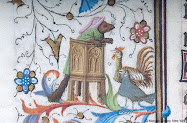So does that make me a political historian? A cultural historian? Both? Neither? Are such distinctions even useful? My thinking on this was in part prompted by a discussion on the political relevance of cultural history, started by Jon Jarrett over at A Corner of Tenth Century Europe and then expanded upon by Magistra et Mater. I agree that for medievalists, making one's research politically relevant within contemporary culture is more important than ever in these days of shrinking humanities funding and ever more stringent demands to prove one's 'impact factor'. (For those unfamiliar with the world of academia, this is basically the demand - expressed in different ways in different countries - to prove that taxes invested in higher education/ research are not being 'wasted' on 'frivolities'. Its nastier and more ignorant face can be seen in the public comments section of any major newspaper when some hapless social science or humanities researcher gets a grant for studying bogan subcultures or some other perfectly sound academic question that the Commentariat, in all its collective wisdom, considers outrageous.*)
But (getting
back to the point) I am made distinctly uncomfortable by the idea that
political relevance implies an overt association with identity politics, or
that an absence of such overt identification and its agendas infers the
'depolitisation' of cultural history. I'm having trouble articulating this
well, but I guess that as someone who is focused in part on the history of
masculinities, I was brought up short by John Tosh’s claim (via Magistra)
that the cultural turn in the field of gender and masculinity has detached it
from the ‘men’s movement’ of the 1970s, and thus robbed it of its political
edge, an argument that has also been advanced in somewhat different forms by a
number of historians who identify as feminist.** I have
to say, I never considered that my interest in the history of masculinities (in my
case, knightly masculinity in particular) has anything to do with any kind of
'men’s movement' or with unearthing positive male role models from the past, and I’d be pretty
disturbed if other people thought that was an agenda that is driving my
research. I suppose I am thinking of gender in more abstract (but no less
politically relevant) terms, in that I am hoping that by uncovering and
unpicking the hidden gender dynamics that underpinned and supported (and also
contested) particular relationships of political power in the past, I can not only shed new light on historic events and structures, but also make
people look with new eyes on such dynamics at work in the modern world. There
is a clearly a political agenda driving my work on medieval political
history, as I believe that the first step to changing a system is to understand
exactly how it works and how it preserves existing privilege.
I often find that when I start explaining my research to IRL friends and
acquaintances, they very quickly have an ‘a ha’ moment when they recognise
parallels or resonances within a specific contemporary political context.***
(For those of you about to accuse me of shameful anachronism, I’m always at pains to
emphasise that I am not positing any simplistic causal relationship between the
medieval past and the present.) The way I see it, cultural
history is an inherently political (and politically relevant) project, even if it
is not overtly associated with any particular movement or strand of
identity politics.
* Just
to be clear on this, I absolutely support Dave Snell’s research and think his
PhD topic was completely legitimate (and really cool!) Indeed, his
investigation into the construction of identities bears a certain, if distant,
relation to my own interests.
** Important
disclaimer here: I have not yet read Tosh’s piece in the edited volume Magistra
discusses (Sean
Brady and John H. Arnold (eds.), What is masculinity? Historical dynamics
from antiquity to the contemporary world (Basingstoke: Palgrave Macmillan,
2011)), so I may be completely misinterpreting this.
*** I will explore this in
more detail in a future post, as I think it is best done through concrete examples rather
than trying to explain it at an abstract level.




No comments:
Post a Comment